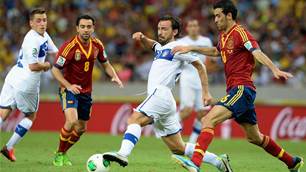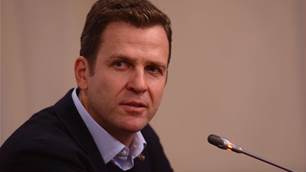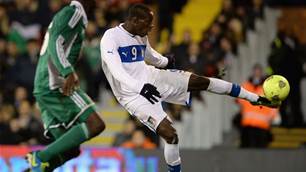Compiled by Jamie Gardner, Press Association Sport
GOALKEEPER - GORDON BANKS
A World Cup winner with England in 1966 as they reached the final without conceding a goal in open play, Banks will best be remembered for a stunning save from Pele in the group phase of the 1970 finals in Mexico. His absence for the quarter-final against West Germany in that tournament is often cited as a key reason for England's defeat.
FULL-BACK - CARLOS ALBERTO
Captain of the Brazil side considered the greatest XI ever assembled in the 1970 finals. A right-back equally at home going forward as he was defending and who set the template for the likes of Cafu and Maicon to follow. Got forward to devastating effect to score Brazil's fourth and final goal against Italy in the 1970 World Cup final, finishing off a sublime team move.
FULL-BACK - PAOLO MALDINI
Along with Johan Cruyff the only member of this XI not to have won the World Cup, having retired from international football before the Azzurri's 2006 triumph in Germany. Maldini was the epitome of cool consistency in over 20 years of football at the highest level and while he was best known as a left-back, he was almost equally as effective in the centre.
CENTRE-BACK - BOBBY MOORE
England's 1966 World Cup-winning captain lacked pace but was rarely if ever caught out of position. He possessed impeccable timing in the tackle and the ideal temperament for international football. Comfortable on the ball, he actually provided the assists for England's first and fourth goals - both scored by West Ham team-mate Geoff Hurst - in the final win over West Germany.
CENTRE-BACK - FABIO CANNAVARO
At only 5ft 9in tall, the Neapolitan has somehow managed to become one of the great central defenders of this or any era. Like Moore, a great reader of the game, he is solid in the tackle and adept at intercepting any danger. Reached the peak of his career in captaining Italy to glory in 2006.
MIDFIELDER - FRANZ BECKENBAUER
Beckenbauer began his international career as an all-action midfielder but by 1974 he was operating as a sweeper in the West Germany side which won on home soil. In this line-up his role would be to anchor the midfield and protect the back four, with his range of passing and ability to burst forward providing another threat in a side posing plenty already.
MIDFIELDER - JOHAN CRUYFF
As the ultimate 'total footballer' it is difficult to pigeonhole the Dutchman into any one position. Nominally a striker but far too intelligent to simply hang around waiting for chances, he was a nightmare to pick up because of his tendency to drop deep or wide, and when he had the ball his searing pace and exemplary technique made him an equally tricky customer.
MIDFIELDER - ZINEDINE ZIDANE
The leader of the pack in the French side which claimed first world and then European glory in 1998 and 2000. His career may have ended in disgrace after his headbutt on Marco Materazzi in the 2006 final but 'Zizou' warrants his place in this stellar line-up because of his creative brilliance and eye for goal.
MIDFIELDER - DIEGO MARADONA
Dragged an otherwise average Argentina side to World Cup glory in 1986 with possibly the greatest individual display of any player in any tournament. His greatest asset was arguably his ability to take on opponents - five or six at a time was no problem - with his mesmeric dribbling skills but his all-round vision was also impeccable - witness the instinctive pass to Jorge Burruchaga for Argentina's winning goal in the 1986 final.
FORWARD - PELE
The Brazilian was a World Cup icon at the age of 17 after playing a vital role in the 1958 World Cup success in Sweden, before winning it twice more in 1962 and 1970. Pele was a tremendous athlete as well as being outrageously skilful and he could score from anywhere - be it a two-yard tap-in or a majestic effort from the halfway line.
FORWARD - GERD MULLER
An international record of 68 goals in 62 appearances for West Germany is testament to Muller's effectiveness as a goalscorer par excellence. Short of stature, but still a threat in the air, Muller was always in the right place at the right time. His international retirement aged 28 meant he could quite easily have added to his tally of 14 goals in the World Cup finals, split between 1970 and 1974.
A World Cup winner with England in 1966 as they reached the final without conceding a goal in open play, Banks will best be remembered for a stunning save from Pele in the group phase of the 1970 finals in Mexico. His absence for the quarter-final against West Germany in that tournament is often cited as a key reason for England's defeat.
FULL-BACK - CARLOS ALBERTO
Captain of the Brazil side considered the greatest XI ever assembled in the 1970 finals. A right-back equally at home going forward as he was defending and who set the template for the likes of Cafu and Maicon to follow. Got forward to devastating effect to score Brazil's fourth and final goal against Italy in the 1970 World Cup final, finishing off a sublime team move.
FULL-BACK - PAOLO MALDINI
Along with Johan Cruyff the only member of this XI not to have won the World Cup, having retired from international football before the Azzurri's 2006 triumph in Germany. Maldini was the epitome of cool consistency in over 20 years of football at the highest level and while he was best known as a left-back, he was almost equally as effective in the centre.
CENTRE-BACK - BOBBY MOORE
England's 1966 World Cup-winning captain lacked pace but was rarely if ever caught out of position. He possessed impeccable timing in the tackle and the ideal temperament for international football. Comfortable on the ball, he actually provided the assists for England's first and fourth goals - both scored by West Ham team-mate Geoff Hurst - in the final win over West Germany.
CENTRE-BACK - FABIO CANNAVARO
At only 5ft 9in tall, the Neapolitan has somehow managed to become one of the great central defenders of this or any era. Like Moore, a great reader of the game, he is solid in the tackle and adept at intercepting any danger. Reached the peak of his career in captaining Italy to glory in 2006.
MIDFIELDER - FRANZ BECKENBAUER
Beckenbauer began his international career as an all-action midfielder but by 1974 he was operating as a sweeper in the West Germany side which won on home soil. In this line-up his role would be to anchor the midfield and protect the back four, with his range of passing and ability to burst forward providing another threat in a side posing plenty already.
MIDFIELDER - JOHAN CRUYFF
As the ultimate 'total footballer' it is difficult to pigeonhole the Dutchman into any one position. Nominally a striker but far too intelligent to simply hang around waiting for chances, he was a nightmare to pick up because of his tendency to drop deep or wide, and when he had the ball his searing pace and exemplary technique made him an equally tricky customer.
MIDFIELDER - ZINEDINE ZIDANE
The leader of the pack in the French side which claimed first world and then European glory in 1998 and 2000. His career may have ended in disgrace after his headbutt on Marco Materazzi in the 2006 final but 'Zizou' warrants his place in this stellar line-up because of his creative brilliance and eye for goal.
MIDFIELDER - DIEGO MARADONA
Dragged an otherwise average Argentina side to World Cup glory in 1986 with possibly the greatest individual display of any player in any tournament. His greatest asset was arguably his ability to take on opponents - five or six at a time was no problem - with his mesmeric dribbling skills but his all-round vision was also impeccable - witness the instinctive pass to Jorge Burruchaga for Argentina's winning goal in the 1986 final.
FORWARD - PELE
The Brazilian was a World Cup icon at the age of 17 after playing a vital role in the 1958 World Cup success in Sweden, before winning it twice more in 1962 and 1970. Pele was a tremendous athlete as well as being outrageously skilful and he could score from anywhere - be it a two-yard tap-in or a majestic effort from the halfway line.
FORWARD - GERD MULLER
An international record of 68 goals in 62 appearances for West Germany is testament to Muller's effectiveness as a goalscorer par excellence. Short of stature, but still a threat in the air, Muller was always in the right place at the right time. His international retirement aged 28 meant he could quite easily have added to his tally of 14 goals in the World Cup finals, split between 1970 and 1974.
Copyright (c) Press Association
Related Articles

Spain versus Italy to go ahead

Germany preparing for World Cup success













